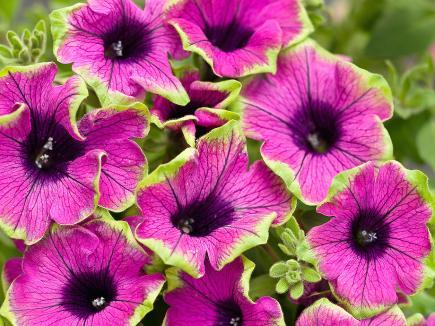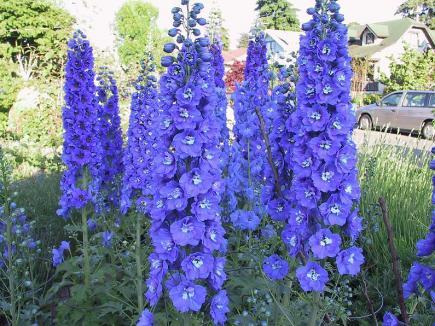June 3, 2014
Terms we still need to explain…

 A common question asked by a customer in a retail garden centre is “What is an annual?” This is typically followed by the response from staff that “annuals are planted every year” – followed by the still confused customer asking a follow up “does that means it grows back?”
A common question asked by a customer in a retail garden centre is “What is an annual?” This is typically followed by the response from staff that “annuals are planted every year” – followed by the still confused customer asking a follow up “does that means it grows back?”
Below we will share a few of our most annoying and confusing gardening terms.
Annual versus perennial
First, apologies to all who we have confused. Annuals live and flower all in one season, then die in winter – while a perennial will continue to grow back year after year. Annuals, before they die, tend to flower their heads off. Annuals include plants like geraniums, petunias, New Guinea Impatiens and Vinca Vine. Perennials on the other hand, tend to bloom only for a few weeks – so the key is to plant different types of perennials together that flower at different times of the year to create a continuously-blooming garden. Plants like iris, daylily and creeping phlox are examples of common perennials. There are also some really neat foliage colours in perennials so many we are also planting for their leaves as much as for their flowers.
Back to annuals – that ‘die in one year’ thing is not always true. Part of the issue is that depending on which region of the country you are in, there are some plants that ‘cross over’ to the other side. Plants that are considered an annual in Southern Ontario might be considered a perennial in Victoria, B.C. and many perennials in Toronto will be only annuals in Winnipeg. Or, if we have a really cold winter then some borderline plants that had been acting like a perennial will not survive. To further complicate the matter, some plants have items in both camps – so there are both annual and perennial types of phlox for example.
We wish there was a good answer to this annual/perennial classification. If annuals had a big sign over them saying ‘these plants are guaranteed to die this winter’ then it would be very clear. Maybe we need new names. We could come up with a ‘summer only’ phrase – or a ‘tender plants’ term that we all like and can understand – If you think of a good solution lets us know. We are open to any ideas!
How hardy is hardy?
Which leads us to the next sort of confusing terms – the word ‘hardy’ as in “is this plant hardy in Toronto?” ‘Hardy’ is gardener secret code for will it survive the average winter and grow again next year? You can see how ‘hardy’ is related to the whole annual/perennial issue as a perennial would be hardy (it will grow again next year), but an annual would not.
The good news here is that we have a ‘hardiness zone map’ available that says that Toronto is hardiness zone 6b, while Orillia is 5a, etc. This hardiness zone information appears on almost all plant tags when you buy them. Each plant will tell you it’s number – in essence, it's survivability rate in your area. Any plant hardiness number that is equal to or less than your zone, should survive over the winter. The higher the zone number, the colder the climate. We confuse people here in that we all seem to struggle with idea that small numbers are better than big numbers. Plus we see some plants suggest they are winter hardy when they are not – Fall Mums are still called Hardy Mums by many and they often are not very hardy... To see what zone you are in, visit http://www.plantmaps.com/interactive-ontario-plant-zone-hardiness-map.php

Annuals flower all season, then die in winter.

Perennials flower only part of the season, but survive the winter and grow again.
Below we will share a few of our most annoying and confusing gardening terms.
Annual versus perennial
First, apologies to all who we have confused. Annuals live and flower all in one season, then die in winter – while a perennial will continue to grow back year after year. Annuals, before they die, tend to flower their heads off. Annuals include plants like geraniums, petunias, New Guinea Impatiens and Vinca Vine. Perennials on the other hand, tend to bloom only for a few weeks – so the key is to plant different types of perennials together that flower at different times of the year to create a continuously-blooming garden. Plants like iris, daylily and creeping phlox are examples of common perennials. There are also some really neat foliage colours in perennials so many we are also planting for their leaves as much as for their flowers.
Back to annuals – that ‘die in one year’ thing is not always true. Part of the issue is that depending on which region of the country you are in, there are some plants that ‘cross over’ to the other side. Plants that are considered an annual in Southern Ontario might be considered a perennial in Victoria, B.C. and many perennials in Toronto will be only annuals in Winnipeg. Or, if we have a really cold winter then some borderline plants that had been acting like a perennial will not survive. To further complicate the matter, some plants have items in both camps – so there are both annual and perennial types of phlox for example.
We wish there was a good answer to this annual/perennial classification. If annuals had a big sign over them saying ‘these plants are guaranteed to die this winter’ then it would be very clear. Maybe we need new names. We could come up with a ‘summer only’ phrase – or a ‘tender plants’ term that we all like and can understand – If you think of a good solution lets us know. We are open to any ideas!
How hardy is hardy?
Which leads us to the next sort of confusing terms – the word ‘hardy’ as in “is this plant hardy in Toronto?” ‘Hardy’ is gardener secret code for will it survive the average winter and grow again next year? You can see how ‘hardy’ is related to the whole annual/perennial issue as a perennial would be hardy (it will grow again next year), but an annual would not.
The good news here is that we have a ‘hardiness zone map’ available that says that Toronto is hardiness zone 6b, while Orillia is 5a, etc. This hardiness zone information appears on almost all plant tags when you buy them. Each plant will tell you it’s number – in essence, it's survivability rate in your area. Any plant hardiness number that is equal to or less than your zone, should survive over the winter. The higher the zone number, the colder the climate. We confuse people here in that we all seem to struggle with idea that small numbers are better than big numbers. Plus we see some plants suggest they are winter hardy when they are not – Fall Mums are still called Hardy Mums by many and they often are not very hardy... To see what zone you are in, visit http://www.plantmaps.com/interactive-ontario-plant-zone-hardiness-map.php